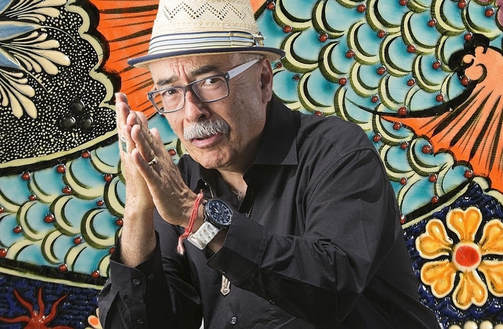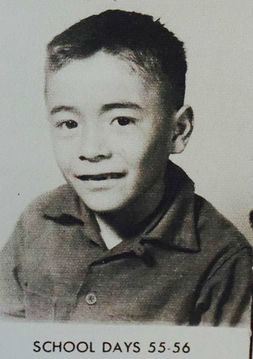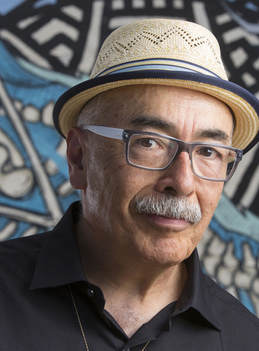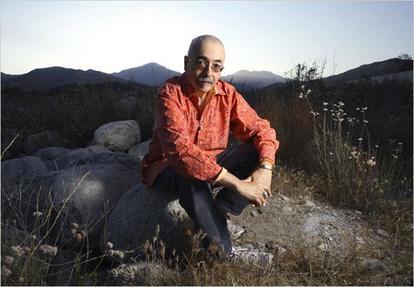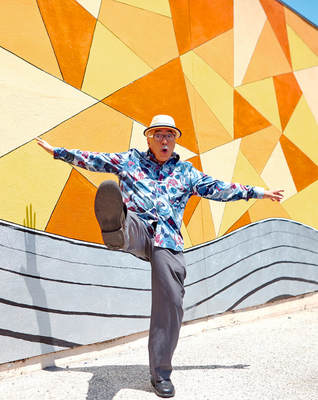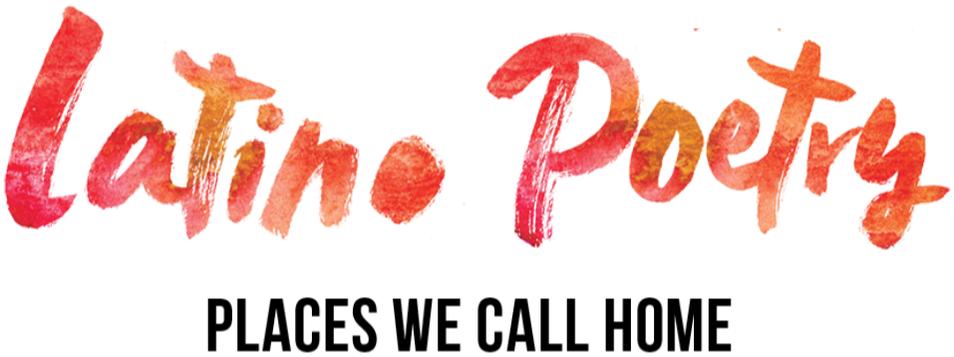Interview with Juan Felipe Herrera
|
The following is a Communal Interview organized by Olga García: Questions from different folks for our Estimado Poet Laureate Juan Felipe Herrera. ELBA R. SANCHEZ poet/educator: My question is about your music. I've always been impressed by how you meld your poetry and music. It's like you're making this delicious caldo and throwing all kinds of things in the mix. Do you have an intent/purpose when you do this creative cooking/melding, and if so, what is it? |
JUAN FELIPE HERRERA: You must feel the words — while having some kind of inner melody going, not like a piano or guitar or even a song, just a groovy sense of how it all is sounding as you go — like the difference between la noche de lluvia vs la noche de cenizas — which one do you feel + hear and therefore love… that’s how you can go about it.. not what they mean or what you want to say.. those are the critic’s questions not the poet’s. — (gracias querida hermana)
|
VIOLETA, 12 year old poeta: Some people think that kids are not affected by the world's political issues but they affect us, as our families are uprooted or separated and DACA kids live in fear. Do you think that U.S. schools should allow kids to liberate these fears through poetry?
J. F. HERRERA: We need schools to provide Freedom education so students will have free thinking. Of course, poetry is an area as all the arts where young people can express complex emotions, ideas, stories, experiences, concepts, visions, new horizons and also solve issues and come up with a new way of responding to issues and crises that at the moment cannot be solved — it is something that we need to encourage, in particular for young people. Young people suffer the consequences of a misdirected society and see it all happen day to day and actually have the answers. Poetry can communicate this easily without losing the heart of it. Thank you Violeta, you are on the right track! |
PERSEPHONE GONZALEZ, mental health worker and super Mestiza surfer: What is freedom? Are you free? Or...
J. F. HERRERA: Freedom is by the second. Not static like concrete. At times I am free, at others I am locked in. To notice the difference is a good start. Peeling away the debris is key — ideas, things, biases. Pour in kindness. And you are there.
PERSEPHONE: What's the one scary story your family keeps repeating for generations, the story they keep telling and retelling?
The story: Coming from Mexico in 1918, my mother’s story and leaving the ranchito in 1890, my father’s story.. Key stories have many other stories within them, that is why they are recounted over and over again — in itself a remodeling. Keep it up, Persephone.
J. F. HERRERA: Freedom is by the second. Not static like concrete. At times I am free, at others I am locked in. To notice the difference is a good start. Peeling away the debris is key — ideas, things, biases. Pour in kindness. And you are there.
PERSEPHONE: What's the one scary story your family keeps repeating for generations, the story they keep telling and retelling?
The story: Coming from Mexico in 1918, my mother’s story and leaving the ranchito in 1890, my father’s story.. Key stories have many other stories within them, that is why they are recounted over and over again — in itself a remodeling. Keep it up, Persephone.
|
LIZ VEGA: Do you think our communication today which is by and large driven through social media will contribute to a renaissance of poetry or to its eventual demise?
J. F. HERRERA: We are in a new time and culture - and a power shift. What we used to define as communication, conversation, social interaction and social relations are not the same. “Society is no longer “out there.” It exist inside the flow of the internet. This is why you see young people sitting down “together” looking into into their “smart phone.” They are totally connected to society and moving within it, “ but not the way we used to before 1986 when the first MAC was delivered to campuses. Any communicative exchange that insists to live pre-1986 at a mass scale faces extinction. Thanks Liz |
MANUEL VELEZ, poet and Chican@ Studies college professor: As poet laureate you've had a chance to experience the national poetry scene. What have you learned from this experience?
J. F. HERRERA: That’s a tough question - people are concerned with what is taking place in the political scene and its implications in a large sphere of concerns — people’s lives most of all, climate change, deportation is a major concern, freedom, racism, strategies for resistance, repression in a number of major Universities, migrant student dropout rate due to parents being targeted by ICE, migrant workers living conditions on townships outside upscale cities where they drive to work, the formation of Worker’s Unions, the continuing struggle for bilingual education by dedicated bilingual teachers and their organizations, new Diversity programs — also White despair & abandonment by the Left, and the rise of corporate power at all levels — we need a Project of and for Extreme Visibility of all our peoples. A lot of inspiration to be gained by visiting many communities. The issues of Refugees is most important. We need to expand and deepen our thinking of what needs to be done. Thanks Manuel!
J. F. HERRERA: That’s a tough question - people are concerned with what is taking place in the political scene and its implications in a large sphere of concerns — people’s lives most of all, climate change, deportation is a major concern, freedom, racism, strategies for resistance, repression in a number of major Universities, migrant student dropout rate due to parents being targeted by ICE, migrant workers living conditions on townships outside upscale cities where they drive to work, the formation of Worker’s Unions, the continuing struggle for bilingual education by dedicated bilingual teachers and their organizations, new Diversity programs — also White despair & abandonment by the Left, and the rise of corporate power at all levels — we need a Project of and for Extreme Visibility of all our peoples. A lot of inspiration to be gained by visiting many communities. The issues of Refugees is most important. We need to expand and deepen our thinking of what needs to be done. Thanks Manuel!
|
MARITZA ÁLVAREZ, Filmmaker, truth seeker and land care taker: What about the creative word for you is unique and sacred? What about the creative word allows it to resonate across borders?
J. F. HERRERA: The creative word is key to joining in and affecting the ways of the universe. For good and not for good. That’s why it can bring rain or wars. It is breath most of all and it is your voice. It envelops all voices if you allow it to do so. It has no borders. Text has borders. Voice is different. Sometimes silence is required. Thanks Maritza! |
ALEJANDRO COVARRUBIAS, Cal State LA Chicana/o Latina/o Studies Department: What does it mean to be the first Xicano poet laureate in the age of Trump? Are there things you are afraid to write about?
J. F. HERRERA: It is most interesting - akin to 1969-74. A great desire to form communities by all. Exhilaration, excitement, search for the next Example of what to do and how to go about — the people are at a cross-roads. What do you propose? Regarding the politics, it is tough. A lot of sharp questions, and also sudden interrogation. To be a People’s Poet today is quite a task — you need to have your poetry expansive, you need to see the questions coming, you need to appreciate the new pressures and crises people are facing and you need to be aware of a large variety of peoples and student's organizing efforts and their suffering against all odds. Also, you need to make contact with large national Latinx Lobbies and groups. Gracias!
J. F. HERRERA: It is most interesting - akin to 1969-74. A great desire to form communities by all. Exhilaration, excitement, search for the next Example of what to do and how to go about — the people are at a cross-roads. What do you propose? Regarding the politics, it is tough. A lot of sharp questions, and also sudden interrogation. To be a People’s Poet today is quite a task — you need to have your poetry expansive, you need to see the questions coming, you need to appreciate the new pressures and crises people are facing and you need to be aware of a large variety of peoples and student's organizing efforts and their suffering against all odds. Also, you need to make contact with large national Latinx Lobbies and groups. Gracias!
|
OLGA GARCÍA ECHEVERRÍA, educator/writer: You are hosting an intimate dinner party where you can invite 5 literary/artistic influences (living or deceased). Who are they and why have you chosen them? What do you feed them?
J. F. HERRERA: I would choose Picasso, Frida Kahlo, Chagall, Dalí and Gloria Anzaldúa — They are all geniuses, groundbreakers, wild-rebels, innovators, daring thinkers, global visionaries and poets! I would serve them giant avocados painted with the face of Nezahualcoyotl and Lorca dancing. And a side of NM Pico de Gallo and Papel Picado tortillas de Oaxaca with a side of vegetarian Pancit. This would please them — with Union Grape Wine-filled carafes. Adelante Olga! JUAN FELIPE HERRERA: Gracias everyone! |
|
Olga García Echeverría
7/8/2017 Comment Box is loading comments...
|
|

